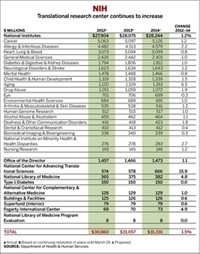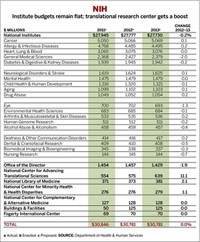Advertisement
Grab your lab coat. Let's get started
Welcome!
Welcome!
Create an account below to get 6 C&EN articles per month, receive newsletters and more - all free.
It seems this is your first time logging in online. Please enter the following information to continue.
As an ACS member you automatically get access to this site. All we need is few more details to create your reading experience.
Not you? Sign in with a different account.
Not you? Sign in with a different account.
ERROR 1
ERROR 1
ERROR 2
ERROR 2
ERROR 2
ERROR 2
ERROR 2
Password and Confirm password must match.
If you have an ACS member number, please enter it here so we can link this account to your membership. (optional)
ERROR 2
ACS values your privacy. By submitting your information, you are gaining access to C&EN and subscribing to our weekly newsletter. We use the information you provide to make your reading experience better, and we will never sell your data to third party members.
Policy
Obama Visits NIH
Funding: President touts $5 billion from recovery act for biomedical research
by Britt E. Erickson
October 1, 2009
The National Institutes of Health has awarded $5 billion in research grants under the American Recovery & Reinvestment Act, President Barack Obama announced during a visit to the NIH campus on Sept. 30. The money will fund more than 12,000 grants and is expected to create tens of thousands of jobs over two years.
The recovery act is "not just about creating make-work jobs; it's about creating jobs that will make a lasting difference for our future," Obama said during his visit. Investing in NIH, he continued, will lead to "jobs conducting research, manufacturing and supplying medical equipment, and building and modernizing laboratories and research facilities."
The awards represent about one-sixth of NIH's annual budget and approximately half of the $10.4 billion stimulus package received by NIH in February. The money given out so far will support projects in several areas including cancer, heart disease, HIV/AIDS, and autism. More than $1 billion of the money will go to studying genomic changes linked to disease, including $175 million dedicated to the Cancer Genome Atlas to collect genetic changes in tissue samples from more than 20 types of cancer.

"We are about to see a quantum leap in our understanding of cancer," NIH Director Francis S. Collins said during the President's visit. "This ambitious effort promises to open new windows into the biology of all cancers, transform approaches to cancer research, and raise the curtain on a more personalized era of cancer care."
The investment is the largest ever in the history of biomedical research. To allocate so much money in such a short period of time is an "amazing accomplishment," remarks Glenn Ruskin, director of public affairs at the American Chemical Society. "What is notable about the NIH achievement is that unlike some other agencies, NIH actually invited new grant submittals," he points out. All of those had to go through the peer review process.
"The staff of NIH should be thanked," comments Mark O. Lively, president of the Federation of American Societies for Experimental Biology. "The review process went incredibly smoothly for so many grant applications in the system."
NIH has until Sept. 30, 2010, to spend the rest of its stimulus money, some of which will go to construction projects.
Blog: An Historic Commitment to Research
The White House - Press Office: Remarks by the President on the American Recovery and Reinvestment Act at the National Institutes of Health
NIH: NIH Research and the American Recovery and Reinvestment Act





Join the conversation
Contact the reporter
Submit a Letter to the Editor for publication
Engage with us on Twitter